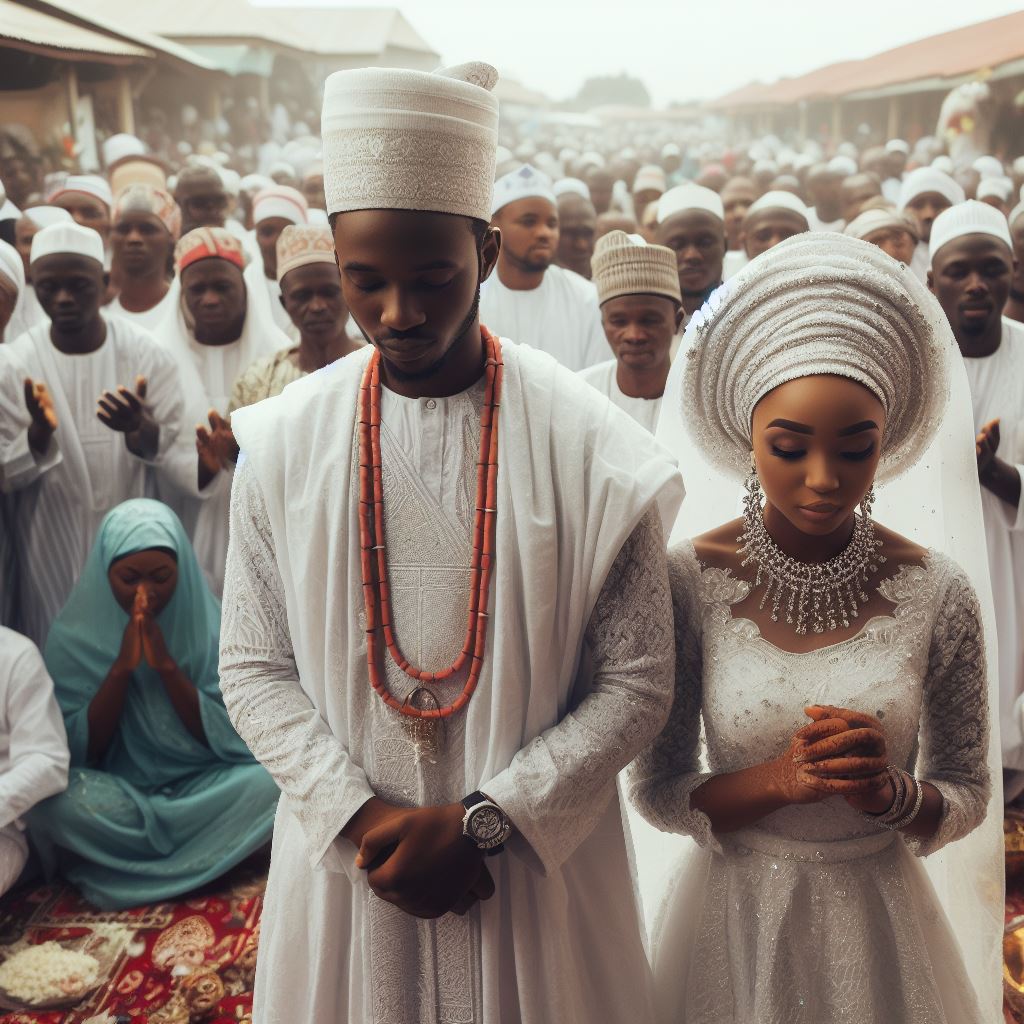Introduction
Nigeria, a diverse country with a strong religious presence, faces unique challenges in marital conflicts.
Brief explanation of the topic
Marital conflicts in Nigeria are often influenced by religious beliefs, practices, and traditions.
Importance of understanding the role of religion in Nigerian marriages
Understanding the role of religion in Nigerian marriages is vital as it sheds light on various dynamics that shape conflicts.
Religious beliefs influence decision-making, expectations, gender roles, and conflict resolution strategies.
Religion provides a framework through which individuals interpret, understand, and respond to various marital issues.
Religious teachings often prescribe specific norms, values, and ethical principles for marital relationships.
Disagreements related to religious practices, observances, and rituals can cause significant conflicts in relationships.
Religion can serve as a source of strength and support during difficult times in marriages.
On the contrary, extreme religious views sometimes contribute to intolerance, rigid beliefs, and inflexibility.
Understanding the role of religion in Nigerian marriages helps professionals provide culturally sensitive counseling and support.
Overview of religion in Nigeria
Main Religions Practiced in Nigeria
1. Christianity
- Christianity is the largest religion in Nigeria, with different denominations such as Catholicism, Protestantism, and Pentecostalism.
- Nigerian Christians believe in Jesus Christ as their Lord and Savior and gather in churches for worship, prayer, and fellowship.
- Christian values such as love, forgiveness, and humility influence marital relationships and conflict resolution.
2. Islam
- Islam is the second-largest religion in Nigeria, particularly dominant in the Northern region.
- Nigerian Muslims follow the teachings of the Prophet Muhammad and uphold the Five Pillars of Islam.
- Practices such as daily prayers, fasting during Ramadan, and adherence to Sharia law guide their lives, including marital conflicts.
3. African Traditional Religions (ATR)
- ATR encompasses various indigenous beliefs and practices in Nigeria.
- It involves ancestor worship, nature reverence, and rituals performed to seek guidance and protection.
- Although ATR’s influence has declined, it still shapes certain cultural norms and values regarding marriage and relationships.
Influence of Religion on Societal Norms and Values
- Religion greatly impacts societal norms and values in Nigeria, including those related to marriage and marital conflicts.
- Christian teachings on fidelity, love, and commitment reinforce monogamous relationships and discourage divorce.
- Islamic teachings emphasize the importance of marriage, respect for spouses, and the duty to resolve conflicts amicably.
- Traditional religious beliefs contribute to the importance of family unity and emphasize the role of elders in conflict resolution.
Role of Religious Leaders in Nigerian Communities
- Religious leaders hold significant influence over their communities’ moral conduct and play a crucial role in marital conflicts.
- They provide spiritual guidance, counseling, and mediation to couples facing challenges.
- Christian pastors and Muslim Imams offer marital counseling services, encouraging couples to seek reconciliation and forgiveness.
- Traditional religious leaders, such as village chiefs and clan heads, mediate conflicts and enforce societal norms and values.
Religion holds immense power in shaping marital conflicts in Nigeria. Christianity, Islam, and African Traditional Religions all contribute to the values, beliefs, and behaviors surrounding marriage.
Religious leaders play a vital role in guiding couples through conflicts and promoting reconciliation.
Understanding the influence of religion on marital conflicts in Nigeria is essential for fostering healthier relationships and promoting harmony within communities.
Read: Financial Aspects: Cost of Acquiring a Marriage Form in Nigeria
Role of religion in shaping Nigerian marriages
In Nigeria, religion plays a significant role in shaping marital conflicts and dynamics.
Often, couples turn to their religious beliefs and teachings to navigate through the ups and downs of their relationships.
Religious beliefs and teachings on marriage
- Religious teachings emphasize that marriage is a sacred institution ordained by God.
- Various religious traditions prescribe specific guidelines on choosing a suitable partner.
- They also provide guidance on the roles and responsibilities of husbands and wives.
- For example, Christianity highlights the importance of love, fidelity, and mutual submission.
- Islam emphasizes the husband’s role as a provider and the wife’s duty to care for the family.
Expectations and obligations within religious marriages
- Religious marriages in Nigeria come with certain expectations and obligations.
- Couples are expected to adhere to religious rituals and ceremonies.
- They must also uphold moral values and live in accordance with religious teachings.
- These expectations often shape the behavior and decision-making process of married individuals.
- Failure to meet these obligations may lead to conflicts within the marriage.
Influence of religious doctrines on marital roles and responsibilities
- Religious doctrines in Nigeria define the roles and responsibilities of husbands and wives.
- For instance, men are expected to be the leaders and providers of the family.
- Women, on the other hand, are expected to be submissive and supportive.
- These prescribed roles often create conflicts when expectations clash with modern views of gender equality.
- Men and women struggle to balance their religious obligations with their personal aspirations.
In essence, religion plays a crucial role in shaping marital conflicts and dynamics in Nigeria.
Religious beliefs and teachings provide guidance and expectations for couples entering into marriage.
These teachings define the roles and responsibilities within the marital relationship.
However, as societal norms evolve, conflicts arise when traditional religious doctrines clash with modern views.
It is important for couples to find a balance between their religious obligations and personal aspirations to foster a healthy and harmonious marriage.
Read: Blending Cultures: Intertribal Marriage Challenges
Impact of Religion on Conflict Resolution in Nigerian Marriages
1. Influence of Religious Teachings on Conflict Management Strategies
Religion plays a significant role in shaping conflict resolution strategies in Nigerian marriages.
Influenced by their religious teachings, couples often turn to prayer and seeking divine intervention as conflict resolution tools.
Religious teachings emphasize forgiveness, patience, and understanding, promoting peaceful conflict resolution methods.
2. Role of Faith Community in Mediating Marital Conflicts
The faith community, comprising religious leaders and fellow believers, plays a crucial role in mediating marital conflicts.
Religious leaders provide counseling services, offering guidance on effective conflict resolution techniques.
The faith community creates a safe space for couples to seek advice, share their struggles, and find support.
3. Challenges and Limitations of Relying Solely on Religious Guidance for Conflict Resolution
While religion can positively influence conflict resolution, it also poses challenges and limitations.
Sometimes, religious teachings might reinforce traditional gender norms, hindering effective conflict resolution in marriages.
Couples may rely solely on prayer and faith, neglecting essential communication and compromise in conflict resolution.
4. Importance of Combining Religious Teachings with Professional Counseling
To address the limitations of relying solely on religious guidance, couples should consider seeking professional counseling.
Professional counselors provide unbiased perspectives, teaching practical conflict resolution skills alongside religious teachings.
Combining religious principles with evidence-based counseling techniques can lead to more effective conflict resolution.
5. Need for Open Dialogue and Collaboration in Interfaith Marriages
In interfaith marriages, conflicts can arise due to differing religious beliefs and practices.
Open dialogue and collaboration between partners can help bridge the gaps caused by religious differences.
Couples should explore ways to respect and accommodate each other’s religious beliefs while finding common ground.
6. Encouraging Education and Awareness on Conflict Resolution
Religious institutions should promote education and awareness on conflict resolution within their congregations.
By conducting workshops, seminars, and providing resources, religious leaders can equip couples with valuable conflict resolution skills.
Increased knowledge and understanding can help Nigerian couples address conflicts more effectively.
In short, religion significantly shapes conflict resolution in Nigerian marriages, influencing strategies and involving the faith community.
It is essential to recognize the limitations of relying solely on religious guidance and combine it with professional counseling for more effective resolution.
Open dialogue, collaboration, and education are also crucial in navigating interfaith marriages.
By embracing a holistic approach, Nigerian couples can strengthen their relationships and achieve healthier conflict resolution.
Read: The Role of In-Laws: Setting Healthy Boundaries

Gain More Insights: Inter-State Marriages: Certificates and Legalities
Case studies and examples
Religion plays a significant role in shaping marital conflicts in Nigeria.
Through case studies and real-life scenarios, we can see how religious differences can create tensions and strife within marriages.
Examining specific cases can provide insights into the impact of religion on marital conflicts.
For instance, consider a Christian-Muslim couple who constantly argue about which faith their children should follow.
This disagreement often leads to heated arguments and stress within the marriage.
Another example is a couple from different denominations of Christianity who have opposing views on certain religious practices, such as attending church services regularly or tithing.
These differences often lead to disagreements about how to live a religious life, causing friction in their relationship.
Real-Life Scenarios
Real-life scenarios help us understand how religion shapes marital conflicts in Nigeria.
In one scenario, a couple faces challenges when the husband’s religious beliefs do not allow him to accept family planning methods.
The wife, who wishes to space their children, feels frustrated and misunderstood, leading to arguments and strain in their marriage.
Another scenario involves a couple whose families strongly adhere to different religions, leading to conflict during religious holidays and celebrations.
These cultural clashes put pressure on the couple to choose between their families, causing distress and tension within their marriage.
Stories of Couples Facing Religious Differences
Personal stories illustrate the impact of religious differences on marital conflicts.
One couple expresses their struggles in finding common ground when it comes to raising their children with a religious identity.
This constant disagreement creates a sense of unease and instability within their relationship.
In another story, a couple faces conflicts due to their different interpretations of religious teachings regarding gender roles.
The husband, influenced by conservative religious beliefs, expects the wife to fulfill traditional domestic roles, while she desires more equality and autonomy.
This clash of expectations leads to ongoing disputes and dissatisfaction in their marriage.
Religion’s Dual Role in Conflict Resolution
Religion can both be helpful and detrimental to conflict resolution within marriages.
Often, couples find solace and guidance in their religious practices when navigating conflicts.
They may seek counsel from religious leaders or find comfort in prayer and meditation, providing a calming influence during turbulent times.
However, religion can also hinder conflict resolution when dogma and rigid interpretations of religious teachings are prioritized over compromise and empathy.
In some cases, couples may feel trapped by religious doctrines, making it difficult to find common ground or negotiate their differences effectively.
In fact, religion plays a significant role in shaping marital conflicts in Nigeria.
Through case studies, real-life scenarios, and personal stories, we have seen how religious differences can lead to tensions and conflicts within marriages.
It is important to acknowledge the dual role religion plays in conflict resolution, as it can both provide guidance and hinder compromise.
Read: Crafting a Humorous Toast for a Nigerian Wedding
Strategies for navigating religious differences in Nigerian marriages
Religion holds immense importance in Nigeria, shaping every aspect of life, including marital conflicts.
Navigating religious differences in Nigerian marriages requires specific strategies to maintain harmony and understanding.
Let’s explore some effective approaches:
- Communication and Understanding: Open and honest communication is crucial in addressing religious conflicts.
Both partners should actively listen and strive to understand each other’s beliefs and perspectives. - Seeking Professional Help: In cases where conflicts escalate or become unmanageable, seeking professional help from counselors or religious leaders can provide valuable guidance and mediation.
- Finding Common Ground: Identifying shared values and beliefs within religious frameworks helps build a foundation of commonality and acceptance between partners.
- Compromise: Cultivating a spirit of compromise is essential to resolving conflicts arising from different religious practices and rituals.
- Respecting Individuality: Recognizing and respecting each partner’s right to their religious beliefs without coercion or pressure fosters a healthy environment for discussion and understanding.
- Educating Oneself: Continuous learning about each other’s religions and customs promotes empathy and appreciation for the partner’s faith, reducing conflicts.
- Establishing Boundaries: Setting boundaries around discussions and actions concerning religious matters helps prevent unnecessary disputes and promotes harmony.
- Empathy and Support: Providing emotional support and empathy during religious events or practices can strengthen the bond between partners and bridge religious gaps.
- Creating Rituals Together: Developing new rituals or incorporating elements from both partners’ religions into shared ceremonies fosters inclusivity and unity.
- Participating in Interfaith Activities: Involvement in interfaith activities and events helps couples connect with others facing similar challenges, gaining insights and support.
Navigating religious differences in Nigerian marriages demands effort, patience, and understanding from both partners.
By employing these strategies, conflicts can be addressed constructively, strengthening the marital bond while preserving religious identities.
Find Out More: Marriage Registry vs. Church Wedding: What’s Legal?
Conclusion
This section has explored how religion shapes marital conflicts in Nigeria.
We have highlighted several key points throughout this discussion.
Recap of main points discussed
We began by acknowledging the strong influence of religion on Nigerian marriages and how it affects the dynamics of marital disputes.
We examined the role of different religious beliefs and practices in shaping couples’ perspectives and attitudes.
Furthermore, we discussed how religious differences can lead to conflicts, with couples struggling to reconcile their beliefs and find common ground.
We also examined how societal expectations and pressure from religious communities can intensify marital disputes.
Additionally, we delved into the significance of open-mindedness and respect in resolving religious conflicts within marriages.
We emphasized the need for couples to cultivate tolerance, understanding, and compromise in navigating religious differences.
Emphasis on the importance of open-mindedness and respect in resolving religious conflicts
It is crucial for couples to approach religious differences with open-mindedness, empathy, and respect.
By creating a safe space for dialogue and understanding, couples can find common values and bridge their differences.
Final thoughts on the significance of religion in Nigerian marriages and its impact on marital disputes
The role of religion in Nigerian marriages cannot be overlooked.
It can both strengthen the marital bond through shared beliefs and values while also becoming a source of tension and conflict.
How couples navigate these challenges determines the resilience of their relationship.
Religion should be seen as an opportunity for growth and mutual respect rather than a divisive factor.
By fostering open-mindedness, couples can overcome religious conflicts, strengthen their bond, and build healthier and more fulfilling marital relationships.




